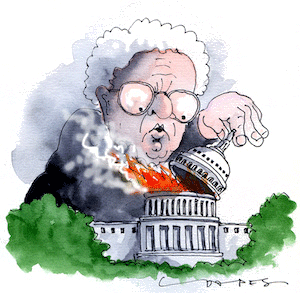A gangster in the White House
SCOTUS rules on Electoral College voting ... Sexual identity and civil rights ... Native-American reservations ... Dreamers ... Presidential tax records ... The power of theocrats and churches ... Some helpful rulings, others less so ... Justice Department habitually supporting Trump's personal battles in court ... Curious belief that a mentally unfit president could be reelected ... Maybe it is possible ... Roger Fitch reports from Washington
 The 2019 supreme court term has ended. Here's who won and who lost.
The 2019 supreme court term has ended. Here's who won and who lost.
First the good news.
"Faithless electors" can be punished; the decision was unanimous - dealing with situations where members of the Electoral College seek to defy the will of a state's voters.
In a Louisiana case, the court ended non-unanimous jury verdicts in state felony trials. Linda Greenhouse was fascinated by the hidden agendas revealed in the individual opinions.
In Bostock, a majority supported a literal reading of the Civil Rights Act of 1964 so as to cover sexual identity and orientation. The conservative Trump appointee Neil Gorsuch joined the court's liberals and wrote the opinion. The Atlantic recounts the fortuitous presence of the word "sex" in American anti-discrimination law.
Bostock will affect overtly discriminatory Health and Human Services regulations recently announced by Trump and under legal attack, but religious zealots hope to use their claims to circumvent the new ruling. Some observers suspect Gorsuch laid landmines in Bostock to further future conservative initiatives.
In Indian Country (as we say) there was the momentous McGirt decision, again featuring Justice Gorsuch, who affirmed the enduring validity of Native-American reservations covering vast areas of eastern Oklahoma.
In the DACA decision (Trump v NAACP), Chief Justice Roberts joined the court's liberals in finding that the Trump administration's efforts to abolish President Obama's Deferred Action for Childhood Arrivals failed, not because it couldn't be done, but because of the sloppy way it was attempted.
Citing respect for precedent, the newly-fluid CJ also joined a liberal majority in June Medical Services v Russo, striking down a Louisiana abortion restriction almost identical to one found unconstitutional by a differently-composed court in 2016.
And then there were unfortunate cases.
As feared by legal writers, more here, faith-based discrimination triumphed at the supreme court, with the Espinoza decision finally giving theocrats victory. Other religious indulgences granted by the supreme court include Little Sisters of the Poor (the "nuns case") about contraception coverage, and the Biel and Morrissey-Berru "religious functions" cases that widely expand a "ministerial" exception to employment discrimination laws.
The decision to preference religions came just in time for churches (notably Catholics) to secure "Covid" government loans, even where their financial straits stemmed from ruinous sexual-abuse payouts.
A disturbing suspension of habeas in immigration cases was countenanced in the Thuraissigiam case, damaging the important Boumediene precedent.
The resolution of Trump's financial subpoena problems was needlessly postponed in Trump v Mazars and Trump v Vance: the controversy continues.
It's unclear what effect the subpoena cases will have on the McGahn case currently on appeal. That's the astonishing case in which a Republican-dominated panel of the DC court of appeals conveniently ruled that federal courts can't enforce congressional subpoenas against employees of the executive branch. House Democrats appealed to a full bench who have heard the case but not yet ruled.
 Gorsuch: suspected of laying landmines
Gorsuch: suspected of laying landmines
In a number of cases this term the Justice Department inappropriately supported Trump personally, e.g, in the subpoena cases. The new term will have (depending on election results) further disreputable Justice interventions, e.g, to find Obamacare unconstitutional, and (building on a 2018 decision) to shield US corporations from liability under the Alien Tort Statute for human rights abuses abroad (more here on DoJ's shameful brief).
• • •
Overseas commentators imbibing American media's "bothsidesism" portray the US as a country gripped in battle between two evenly-matched, morally-equivalent political parties with sincerely-held views, each vying for the voters' support. Even so, according to this doomsday narrative, an insoluble "partisan" deadlock in the US is leading to a "failed state".
Not infrequently, it's assumed - without basis - that Donald Trump, a man who lost the popular vote in 2016 (his polls have rarely risen above the low-40s since), whose psychiatric-based 25th Amendment removal was already under discussion in January 2017, who helped his party lose 48 House seats in 2018 and was actually impeached in 2019, is somehow representative of, and likely to be re-elected by, a majority of Americans, despite the devastating consequences that would bring to their country.
It's an insulting assertion, blaming the victims rather than the actual architect of America's current dysfunction: the gangster in the White House, the worst-ever leader in US history.
Native fascism has indeed received popular support in America before, but only a cynical belief that crime pays, and Americans are mulishly stupid, explains the notion of an openly-corrupt, mentally-ill conman winning re-election.
A substantial number of Trump voters have soured on him, and won't vote for him again. At best, his support may approach the highest free-election achievement of another evil demagogue.
Der Führer retained office by avoiding further free elections; sadly, there are two ways (here and here) that a defeated Trump might also contrive to remain in office.